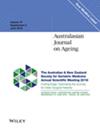Experiences of accessing injury prevention, treatment and rehabilitation services for older Māori
Abstract
Objective
Unintentional injuries cause significant morbidity and mortality for older adults. Māori, the Indigenous people of Aotearoa New Zealand (NZ), experience inequitable access to injury treatment and care services; however, the extent to which this impacts older Māori is unknown. Our objective was to explore older Māori, family and stakeholders' perceptions and experiences of injury-related care and access for older Māori.
Methods
Convenience sampling was used to recruit three participant groups: older Māori (aged ≥55, and living in two regional areas of NZ); family/support network members (whānau) of older Māori; stakeholders (roles in injury prevention/care, health professionals, injury policy, health navigators or Indigenous health service development). Data were collected through demographic questionnaires and in-person interviews or focus groups. A general inductive approach to thematic analysis was utilised, guided by Māori research theory to situate the findings in the relevant social, political and cultural context for Māori.
Results
Forty-four people participated between September and November 2021 (n = 23 older Māori; n = 21 stakeholders). The findings generated four themes. First, quality of care impacts holistic well-being. Second, informed advocates and advocacy to access and connect injury-related care. Third, culturally safe and Māori-led care. Fourth, the role of family and self in injury-related care.
Conclusions
Unintentional injury-related care in older Māori is difficult to access and navigate, often not meeting the multidimensional well-being needs of older Māori. Solutions that support advocacy and navigation through the health system are required to respond to mental health and social, as well as physical needs.

 求助内容:
求助内容: 应助结果提醒方式:
应助结果提醒方式:


